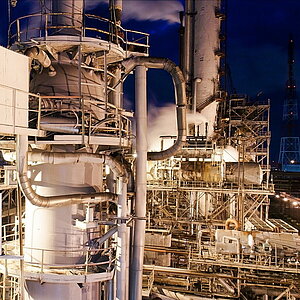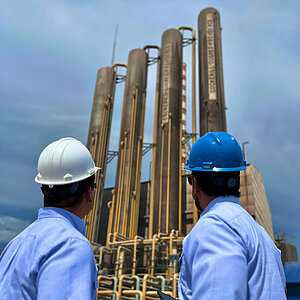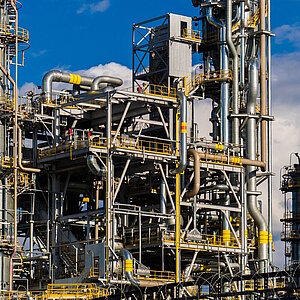Thailand to reduce long-term nitrous oxide emissions

Thailand’s Environment Minister signs commitment to climate-friendly nitric acid production.
On Thursday, 8 April 2021, Thai Natural Resources and Environment Minister Varawut Silpa-archa signed a commitment to ensuring the long-term mitigation of nitrous oxide emissions (N2O) in his country. The greenhouse gas N2O is created as an unwanted by-product from the production of nitric acid: its effect as a greenhouse gas is 265 times stronger than carbon dioxide (CO2).
During the signing ceremony in Bangkok, attended by German Ambassador to Thailand Georg Schmidt, the Thai Ministry of Natural Resources and Environment (MoNRE) confirmed its intention to implement policy measures aimed at achieving long-term reductions in the country’s N2O emissions from nitric acid production.
This Statement of Undertaking was signed as part of the cooperation with the Nitric Acid Climate Action Group a group that has been established by the Federal Ministry for the Environment, Nature Conservation, Building and Nuclear Safety (BMU), and which is financed by the BMU’s International Climate Initiative.
In technical terms, the abatement of N2O emissions is relatively simple and can be achieved for the comparatively low cost of one to five US dollars per tonne of CO2 equivalent. Under ideal conditions, abatement technology can achieve an efficiency of 98 percent in terms of reductions to nitrous oxide emissions. Worldwide, the potential for mitigation in this sector amounts to well over a gigatonne of CO2e over the next 10 years.
Support is being offered both in terms of technology and policy-making: partner countries receive assistance for the long-term regulation of these emissions and for the integration of the sector into nationally determined contributions (NDCs). In addition, NACAG also offers financial support to countries who have signed the political commitment (Statement of Undertaking) to ensuring the long-term mitigation of their emissions.
To date, this Statement of Undertaking (SoU) has been signed by Georgia, Mexico, Tunisia, Uzbekistan and Zimbabwe. Another eight countries have signed the NACAG Declaration as a non-binding expression of support for the Group’s goals and a consideration of the SoU as a next step in this process. NACAG has also made considerable progress in dialogue with another 15 countries with the aim of offering political and technical support.
This decision by MoNRE entitles the Thai nitric acid plant ‘Thai Nitrate’ to receive financial support from the NACAG Secretariat for the installation of catalytic converters for the abatement of N2O emissions plus sensing instruments for its production facilities. In Thailand, the potential for emissions mitigation is estimated at 180,000 t CO2 equivalent per year, which is equivalent to roughly 120,000 flights between Bangkok and Berlin.
The link has been copied to the clipboard
Contact
IKI Office
Zukunft – Umwelt – Gesellschaft (ZUG) gGmbH
Stresemannstraße 69-71
10963 Berlin







![[Translate to English:]](/fileadmin/_processed_/b/e/csm_2023043_NACAG_AdobeStock_162896684_Alexsei_96f01275b9.jpeg)








